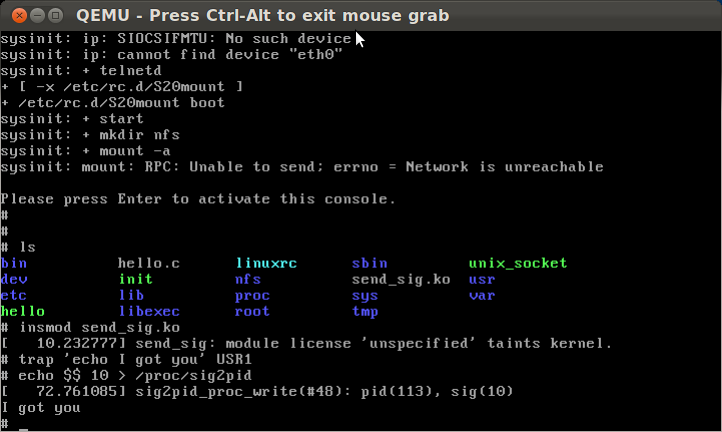send signal to user-space
某天有個需求是希望當kernel發生某事件時通知user-space的process,心裡想最快就是送signal,於是google一下,果然有人有類似的需求,signals handling in the kernel,於是改了一下把他放上來,值得一提的是,其實這樣並不被鼓勵的,而且原本的kill_proc_info並沒有被export出來,所以如果是module要使用的話,就必須把他export出來,EXPORT_SYMBOL(kill_proc_info)。

#include <linux/module.h>
#include <linux/init.h>
#include <linux/moduleparam.h>
#include <linux/sched.h>
#include <linux/kernel.h> /* printk() */
// #include <linux/slab.h> /* kmalloc() */
#include <linux/errno.h> /* error codes */
#include <linux/types.h> /* size_t */
#include <linux/signal.h>
#include <linux/proc_fs.h>
#include <linux/uaccess.h>
#define PROC_NAME "sig2pid"
/**
* 送signal 到pid去
*/
static int send_sig_to_pid(int sig, pid_t pid)
{
struct siginfo info;
info.si_signo = sig;
info.si_errno = 0;
info.si_code = SI_USER; // sent by kill, sigsend, raise
info.si_pid = get_current()->pid; // sender's pid
info.si_uid = current_uid(); // sender's uid
return kill_proc_info(sig, &info, pid);
}
/**
* /proc/sig2pid的write ops
*/
static int
sig2pid_proc_write(struct file *file, const char __user * buffer,
unsigned long count, void *data)
{
int sig, pid, ret;
char line[count];
ret = copy_from_user(line, buffer, count);
if (ret) {
return -EFAULT;
}
sscanf(line, "%d %d", &pid, &sig);
printk("%s(#%d): pid(%d), sig(%d)\n",
__func__, __LINE__, pid, sig);
send_sig_to_pid(sig, (pid_t) pid);
return count;
}
/**
* 建立/proc/sig2pid
*/
static int create_proc_file(void)
{
struct proc_dir_entry *p;
p = create_proc_entry(PROC_NAME, S_IFREG | S_IWUGO, NULL);
if (!p) {
printk("%s(#%d): create proc entry failed\n", __func__, __LINE__);
return -EFAULT;
}
p->write_proc = sig2pid_proc_write;
return 0;
}
int sig2pid_init_module(void)
{
return create_proc_file();
}
void sig2pid_exit_module(void)
{
remove_proc_entry(PROC_NAME, NULL);
}
module_init(sig2pid_init_module);
module_exit(sig2pid_exit_module);
# Comment/uncomment the following line to disable/enable debugging
#DEBUG = y
# EXTRA_CFLAGS += -Werror -Wall
# Add your debugging flag (or not) to CFLAGS
ifeq ($(DEBUG),y)
EXTRA_CFLAGS += -O -g -DDEBUG # "-O" is needed to expand inlines
else
EXTRA_CFLAGS += -O2
endif
ifneq ($(KERNELRELEASE),)
# call from kernel build system
obj-m := send_sig.o
else
KERNELDIR ?= /lib/modules/$(shell uname -r)/build
PWD := $(shell pwd)
default:
$(MAKE) -C $(KERNELDIR) M=$(PWD) modules
endif
clean:
rm -rf *.o *~ core .depend .*.cmd *.ko *.mod.c .tmp_versions
depend .depend dep:
$(CC) $(CFLAGS) -M *.c > .depend
ifeq (.depend,$(wildcard .depend))
include .depend
endif
參考資料:
http://old.nabble.com/signals-handling-in-the-kernel-to12032525.html#a12032525 , signals handling in the kernel.
http://kerneltrap.org/node/5800, how to send signal from kernel space to user space.
github: https://github.com/brook-kuo/Linux_Module/tree/master/process/send_sig_to_userspace